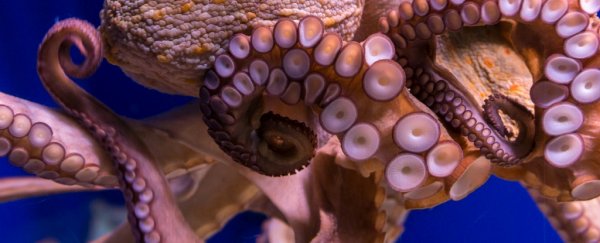With the ability to use tools, solve complex puzzles, and even play tricks on humans just for funsies, octopuses are fiercely smart. But their intelligence is quite weirdly built, since the eight-armed cephalopods have evolved differently from pretty much every other type of organism on Earth.
Rather than a centralised nervous system such as vertebrates have, two-thirds of an octopus's neurons are spread throughout its body, distributed between its arms. And now scientists have determined that those neurons can make decisions without input from the brain.
"One of the big picture questions we have is just how a distributed nervous system would work, especially when it's trying to do something complicated, like move through fluid and find food on a complex ocean floor," said neuroscientist David Gire of the University of Washington.
"There are a lot of open questions about how these nodes in the nervous system are connected to each other."
The research was conducted on live Giant Pacific octopuses (Enteroctopus dofleini) and East Pacific red octopuses (Octopus rubescens), both native to the North Pacific Ocean.
These octopuses have around 500 million neurons, around 350 million of which are along the arms, arranged in clusters called ganglia. These help process sensory information on the fly, allowing the octopus to react faster to external factors.
"The octopus' arms have a neural ring that bypasses the brain, and so the arms can send information to each other without the brain being aware of it," said behavioural neuroscientist Dominic Sivitilli of the University of Washington.
"So while the brain isn't quite sure where the arms are in space, the arms know where each other are and this allows the arms to coordinate during actions like crawling locomotion."
The team gave the cephalopods a variety of objects such as cinder blocks, textured rocks, Lego bricks and puzzle mazes with treats inside, and also filmed them while they were foraging for food.
The researchers also used behavioural tracking and neural recording techniques. This was to determine how information was flowing through an octopus's nervous system as it foraged or explored, depending on how the arms were working - either in sync, suggesting centralised control, or alone, suggesting independent decision-making.
They found that when the octopus's suckers acquire sensory and motor information from their environment, the neurons in the arm can process it, and initiate action. The brain doesn't have to do a thing.
"You're seeing a lot of little decisions being made by these distributed ganglia, just by watching the arm move, so one of the first things we're doing is trying to break down what that movement actually looks like, from a computational perspective," Gire said.
"What we're looking at, more than what's been looked at in the past, is how sensory information is being integrated in this network while the animal is making complicated decisions."
This is consistent with previous research, which has found that not only do octopus arms forage independently of the brain, but that they can continue to respond to stimuli even after being severed from a dead animal.
It's so wack that octopuses are often considered as close to alien as a terrestrial intelligence can be (and in one memorable proposal, maybe even actually alien). As such, it's considered not only useful to study them to understand intelligence on Earth, but perhaps as a way to prepare for smart aliens - if that day ever comes.
"It's an alternative model for intelligence," Sivitilli said. "It gives us an understanding as to the diversity of cognition in the world, and perhaps the Universe."
The team's research has been presented at the 2019 Astrobiology Science Conference.
